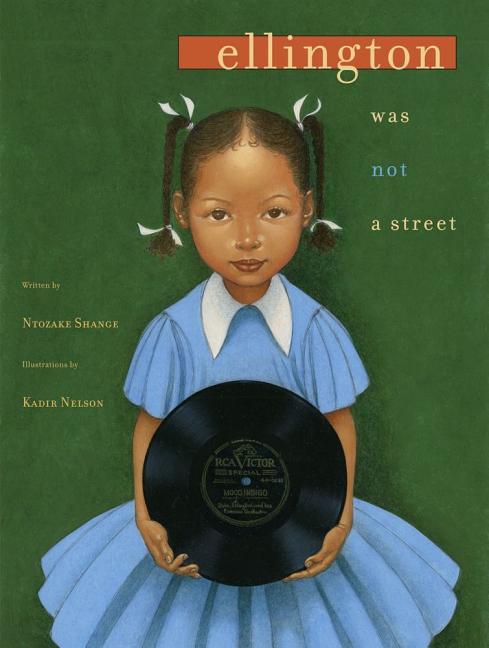Book Descriptions
for Ellington Was Not a Street by Ntozake Shange and Kadir Nelson
From Cooperative Children's Book Center (CCBC)
Ntozake Shange’s 1983 poem “Mood Indigo,” which she wrote as a tribute to many of the Black American men “who changed the world,” is the text of a powerful picture book stunningly illustrated by Kadir Nelson. Shange’s poem references “Mood Indigo” as the title of a song by Duke Ellington, who, along with musicians such as Dizzy Gillespie and Paul Robeson, move in and out of the home of the poem’s narrator—a young woman looking back on her childhood. Other visitors include W.E.B. DuBois, Virgil “Honey Bear” Akins and President Kwame Nkurmah of Ghana. The poem speaks to the cultural and social history of African Americans as well as continuing struggles: “politics as necessary as collards,” “sonny til was not a boy”, “virgil akins was not the only fighter,” “our windows were not cement or steel.” Nelson’s full-page portraits of the men conversing and interacting with one another, watched by the young girl, provide an elegant visual narrative. Each painting is beautifully composed and balanced, full of vibrant, dignified individuals. Brief biographical information about each individual referenced in the text is provided on the final two pages in a book that is an enriching encounter with history, art, and poetry. (Ages 6–18)
CCBC Choices 2005 . © Cooperative Children's Book Center, Univ. of Wisconsin - Madison, 2005. Used with permission.
From the Publisher
In a reflective tribute to the African-American community of old, noted poet Ntozake Shange recalls her childhood home and the close-knit group of innovators that often gathered there. These men of vision, brought to life in the majestic paintings of artist Kadir Nelson, lived at a time when the color of their skin dictated where they could live, what schools they could attend, and even where they could sit on a bus or in a movie theater.
Yet in the face of this tremendous adversity, these dedicated souls and others like them not only demonstrated the importance of Black culture in America, but also helped issue in a movement that "changed the world." Their lives and their works inspire us to this day, and serve as a guide to how we approach the challenges of tomorrow.
Yet in the face of this tremendous adversity, these dedicated souls and others like them not only demonstrated the importance of Black culture in America, but also helped issue in a movement that "changed the world." Their lives and their works inspire us to this day, and serve as a guide to how we approach the challenges of tomorrow.
Publisher description retrieved from Google Books.


